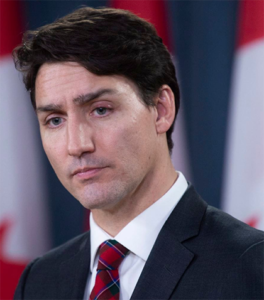Canada reverses welcoming refugee policy
Canada appears to have made a sudden U-turn in its on-the-ground policy of welcoming asylum seekers and providing a safe haven for refugees.
And the move is also likely to impact its international reputation as a refugee-friendly country.
Prime Minister Justin Trudeau’s Liberal government is planning to change the law to make it harder for refugees to go what it terms “asylum shopping”.
Trudeau’s Liberal government is planning to change the law to make it harder for refugees to go what it terms “asylum shopping”.
The law was introduced as part of the government’s recent budget bill.
It will make ineligible those asylum seekers at the border who have already made a claim in another country that has an immigration information-sharing agreement with Canada. These include the US, UK, Australia and New Zealand.
They would also not be entitled to an oral appeal by an independent tribunal or a court. But they would still be subject to a pre-removal risk assessment to determine if they will likely be executed or tortured if they are deported to their home country.
However, legal experts and refugee advocates warn these changes would be flouting domestic and international law, as well as ruining Canada’s reputation as a defender of refugees.
Amnesty International, the Canadian Association of Refugee Lawyers, the Canadian civil-liberties association and the Canadian Council for Refugees wrote a joint letter to the prime minister urging the government to rescind the new law.
Refugee lawyer and law professor Jamie Liew says Canada should not be allowing the US – which does not accept refugee claims based on domestic violence or gender identity, unlike Canada – to make decisions that affect domestic refugee claims.
“We shouldn’t be relying on the decision of other country – Canada shouldn’t be delegating that,” she says.
Since Justin Trudeau’s election in 2014, the country has earned an international reputation for being welcoming to refugees at a time when many other countries were cracking down on their borders.
After US President Donald Trump announced a ban on entry to the US from seven Muslim-majority countries, Mr Trudeau tweeted that “Canadians will welcome you, regardless of your faith”.
This perception that Canada will open its arms to all refugees, coupled with increasingly restrictive immigration policies in the US, has led to an influx of claims made at the Canada-US border.
More than 40,000 asylum seekers have crossed into Canada at the US border since Trump was elected.
Cities along the border have struggled with providing services to the thousands who are waiting for their claims to be heard – in Montreal, the Olympic stadium was converted into temporary housing.
Advocates say if the new law denies refugee claimants an oral hearing, it will likely be overturned.
But what may also be overturned is Canada’s international reputation as a welcoming country.
Laurie Nowell
AMES Australia Senior Journalist












